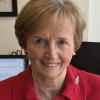I met her sitting on the street outside a cinema in Dublin, with her bags and all her worldly goods at her feet. I sat down beside her on the street.
She sat there silently, refusing to look or respond to me. I tried to listen to her silence, but the street was filled with her pain. She began to look at me. I reached out and touched her; I assured her I could take her to a safe place (wondering as I spotted her black bags how I would get her to a safe place while making sure she could take all her worldly belongings with her).
We began our journey back to a safe place. Many hours later she said simply, "How much more do I have to take?"
She slowly started to tell me in a slurred speech how she ran away from home and relationships. How the drinking and the cutting of her body brought her relief from the tension she was experiencing. She was ostracized in her local community. She was condemned for all the masks she wore. She survived in our world by wearing these masks. She had never known another way.
Hitting rock bottom became a blessing and a possibility for her, a threshold of hope, a new beginning as she came to a place of support. I was a constant support for her for many years and eventually a deep friendship evolved between us. I realized during that time with her — and with the other people like her that I worked with — what the God of our lives is all about: God active in each other. God whose heart always welcomes us, provides refuge for us, and helps us to begin again.
My friend Jennifer brought a lot of blessings into my life. She worked through all her personal issues, went back to school, and eventually received a diploma in Community Development. She was a woman of great strength. We both risked encountering each other — perhaps for the first time. Her homelessness became a learning experience for me and a moment of blessing.
She took me to all sorts of unsavoury places I might not have visited otherwise. She loved celebrating. She loved cooking, but initially this was difficult, as her resources were very limited. She would invite friends, prepare the table — which initially was a cardboard box —where we all sat around and shared the meal, shared our stories, the ritual of healing, of how our wounds ached for recognition.
These moments are wonderful memories for me — moments of laughter, blessing, joy and excitement. We were friends coming back to a place called "home" within ourselves. Jennifer and the many women I have worked with over the years taught me the meaning of life, love, encounter, and of what happens between people who allow themselves to be known. These women have taught me deeply about loving, and being accepted for who you are.
In 1997 my community, the Daughters of Wisdom, founded an organization in Ireland called Sophia Housing to support families who are homeless, in collaboration with many other religious congregations. Now after 22 years, we continue to provide holistic support for women and children who are homeless, to help them become more aware of their own inner strengths and potential.
When women and children come to Sophia Housing, their search for housing has ended, and they have a space they can call "home." We believe that housing is an absolute priority for families, but housing alone is not enough! Families who have spent long periods on the street, in hostels or in other temporary housing need housing "with support."
Meeting homeless people, I came to realize their longing is to be loved, healed and embraced, and to experience new possibilities. They need for people to spend time with them. They need creative space on their journey towards resettlement and (especially women with children) need transitional time, a stopping-off point on the journey to come apart and rest for a while. The Irish poet W. B. Yeats described this as "to come aside and hear lake waters lapping with low sounds by the seashore."
[Jean Quinn is a member of the Congregation of the Daughters of Wisdom. She is currently the executive director of UNANIMA International, an NGO at the U.N. which is a coalition of 22 groups of women religious. She continues her work with the homeless as the co-chair of the NGO Working Group to End Homelessness.]

